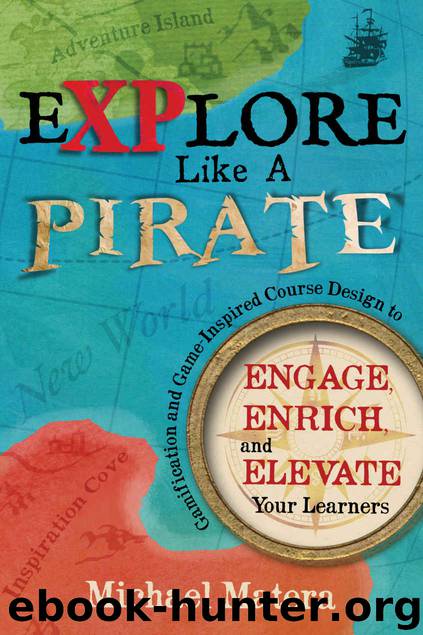Explore Like a Pirate: Engage, Enrich, and Elevate Your Learners with Gamification and Game-inspired Course Design by Michael Matera

Author:Michael Matera [Matera, Michael]
Language: eng
Format: epub
Publisher: Dave Burgess Consulting, Inc
Published: 2015-12-11T18:30:00+00:00
Skills
Explanation
Skills are characteristics of players that can grow through gameplay.
Pros
• Fulfills status, access, and power of SAPS theory
• Creates meaningful game choices for students
Cons
• Can create imbalance in the game if all skills are not equally powerful
Uses and Ideas
Skills are foundational to many games. The game Diablo, for example, asks players to make a major decision right from the load screen. Players have to select a character class before they embark on the epic 100+ hour adventure that is the game. The choices are barbarian, wizard, and monk. Each of these characters comes with special benefits that only they can earn or unlock, as they gain experience and level up. Once the player selects his or her character class, there is no changing it; it represents the player for the entirety of the game and determines what he or she can do.
If you don’t like the idea of using items in your game, skills are another great way to go. Skills and items can also be used together to create a rich learning environment. Skills, though more challenging to create, are in many ways easier to manage. Character skills are a “cool” addition to any game, as they provide reasons for students to collaborate in teams that benefit one another.
A word of caution: In my opinion, it can be incredibly hard to make a skills chart for your first game. Each of the character types needs to be balanced and worth choosing. You won’t be able to adjust the character classes once you start, as students can’t switch; they will protest if they determine their choice would have been different had they known what the abilities would become.
An educational resource that uses skills really well is Classcraft.com In this game, each of the characters has abilities that can help each member of the group. Students should be encouraged naturally by the game to make sure they have a player representing each skill type.
By having different types of players, you are creating a collaborative experience for your students and an opportunity for them to be proud of the leveling up of their character.
For those of you struggling with the difference between items and skills, there is little to none. Take the spear item we looked at before, which has the power to skip a team’s turn during a review game. In a skills-based game, this power is earned by leveling up one’s character type. I have toyed with the idea of making a power up chart for each of my classes that students can select from and create unique classroom powers as their house total XP increases. Again, the chief concern is making sure the characters are balanced.
Download
This site does not store any files on its server. We only index and link to content provided by other sites. Please contact the content providers to delete copyright contents if any and email us, we'll remove relevant links or contents immediately.
| Administration | Assessment |
| Educational Psychology | Experimental Methods |
| History | Language Experience Approach |
| Philosophy & Social Aspects | Reform & Policy |
| Research |
The Art of Coaching Workbook by Elena Aguilar(51148)
Trainspotting by Irvine Welsh(21624)
Twilight of the Idols With the Antichrist and Ecce Homo by Friedrich Nietzsche(18611)
Fangirl by Rainbow Rowell(9220)
Periodization Training for Sports by Tudor Bompa(8240)
Change Your Questions, Change Your Life by Marilee Adams(7725)
This Is How You Lose Her by Junot Diaz(6866)
Asking the Right Questions: A Guide to Critical Thinking by M. Neil Browne & Stuart M. Keeley(5747)
Grit by Angela Duckworth(5589)
Red Sparrow by Jason Matthews(5460)
Paper Towns by Green John(5168)
Room 212 by Kate Stewart(5095)
Ken Follett - World without end by Ken Follett(4712)
Housekeeping by Marilynne Robinson(4429)
The Sports Rules Book by Human Kinetics(4374)
Double Down (Diary of a Wimpy Kid Book 11) by Jeff Kinney(4257)
Papillon (English) by Henri Charrière(4247)
The Motorcycle Diaries by Ernesto Che Guevara(4078)
Exercise Technique Manual for Resistance Training by National Strength & Conditioning Association(4052)
